This post may contain affiliate links which means I will get a commission if you make a purchase at no additional cost to you. As an Amazon Associate I earn from qualifying purchases. Please read my disclosure for details.
Nigerian Bitter Leaf Soup is a traditional dish that is packed with flavor. If you’re looking for a new soup to add to your repertoire, this is the perfect recipe for you!
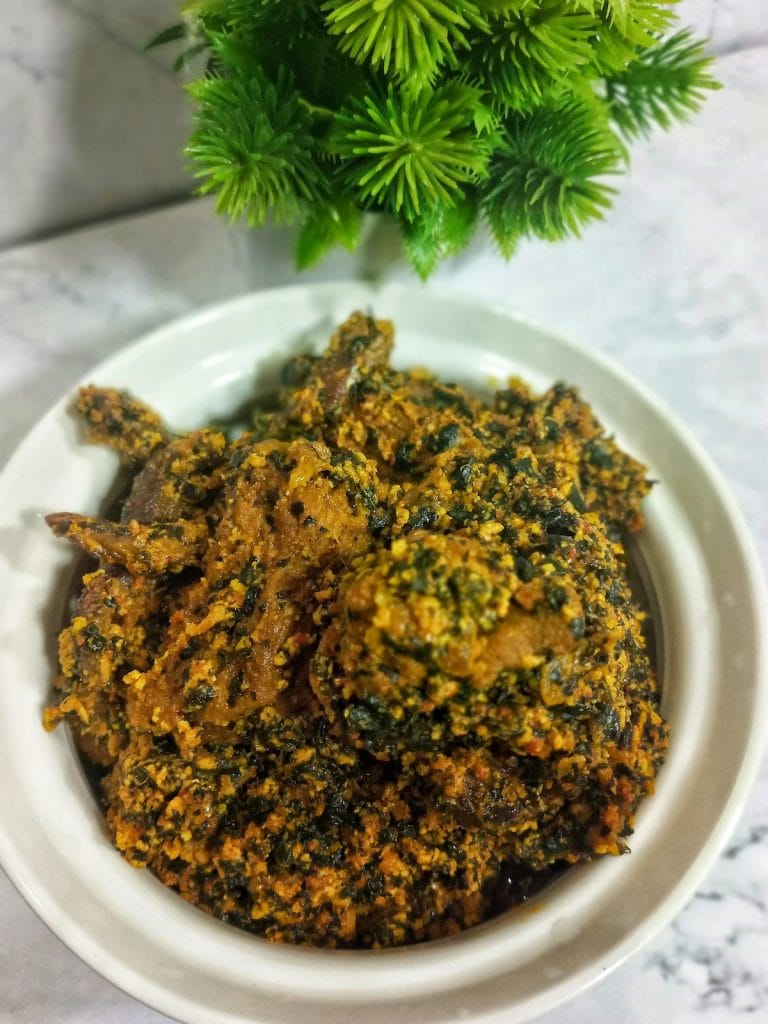
WANT TO SAVE THIS RECIPE?
Bitter-leaf soup is a popular dish from the Igbo tribe of Nigeria. It is made of simple traditional ingredients with assorted meat and fish.
Who would have thought that the “oh so bitter” bitter leaves would make a delicious soup to the point of many people’s approval? Certainly, the Igbo people of Anambra state in Nigeria!
This exotic bitter-leaf soup is a blessing to your health and tastebuds, the assorted meat and fish in it will have you stuck.
Ofe Onugbu pairs very well with many Nigerian foods, especially the delicious fufu dishes.
What Is Bitter Leaf Soup?
Bitter leaf soup is a traditional soup from the eastern part of Nigeria – another living proof that the Igbo people do it better.
It is made with the greens of vernonia amygdalina, which is known as bitter leaves in English, onugbu in Igbo, ewuro in Yoruba, and shiwaka in Hausa.
It is a highly nutritious soup that is now a favorite soup in many non-Igbos homes in Nigeria and other West African countries like Ghana and Cameroon.
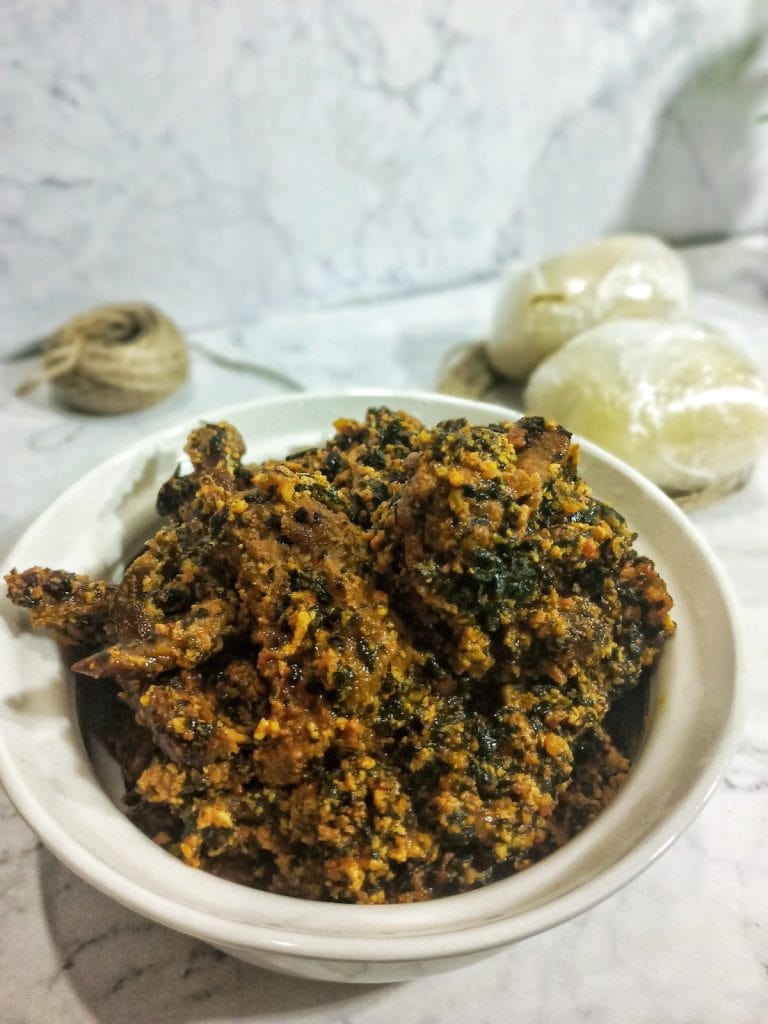
This soup can be prepared in five different ways. While some people use egusi as it is used in this recipe, others use cocoyam paste, achi, ofor, or ogbono as the soup thickener.
Why You’ll Love This Recipe
- Keto-friendly – This particular recipe is keto-friendly, it does not contain starchy thickeners like edible cocoyam. The thickener used, egusi is known to be rich in 50% healthy fats and 30% protein, making it a good low-carbohydrate food for you.
- Delicious – Forget the misconception that Nigerian bitter leaf soup is not delicious because of its slightly bitter taste. If you follow this simple recipe duly, trust me, you will be back to preparing it over and over again.
- Budget-friendly – Nigerian bitter leaf soup is very economical.
What Does Bitter Leaf Soup Taste Like?
Nigerian bitter leaf soup is a slightly bitter soup. The bitter taste is caused by bitter leaves, which are the key ingredient in the dish.
When you add the assorted fish and meat, the rich, umami taste of these proteins mix with the slightly bitter taste of the vegetable to get a super tasty, rich soup.
Is Nigerian Bitter Leaf Soup Healthy?
Yes, a single plate of Nigerian bitter leaf soup is a host of health benefits. The bitter leaf vegetables are rich in vitamins like vitamin A, vitamin B1, vitamin B2, vitamin C, vitamin E, and vitamin K and minerals like zinc, magnesium, iron, potassium, and calcium.
The other key ingredients, meats, fish, and pepper are not left out in terms of the health benefits they offer to the body.
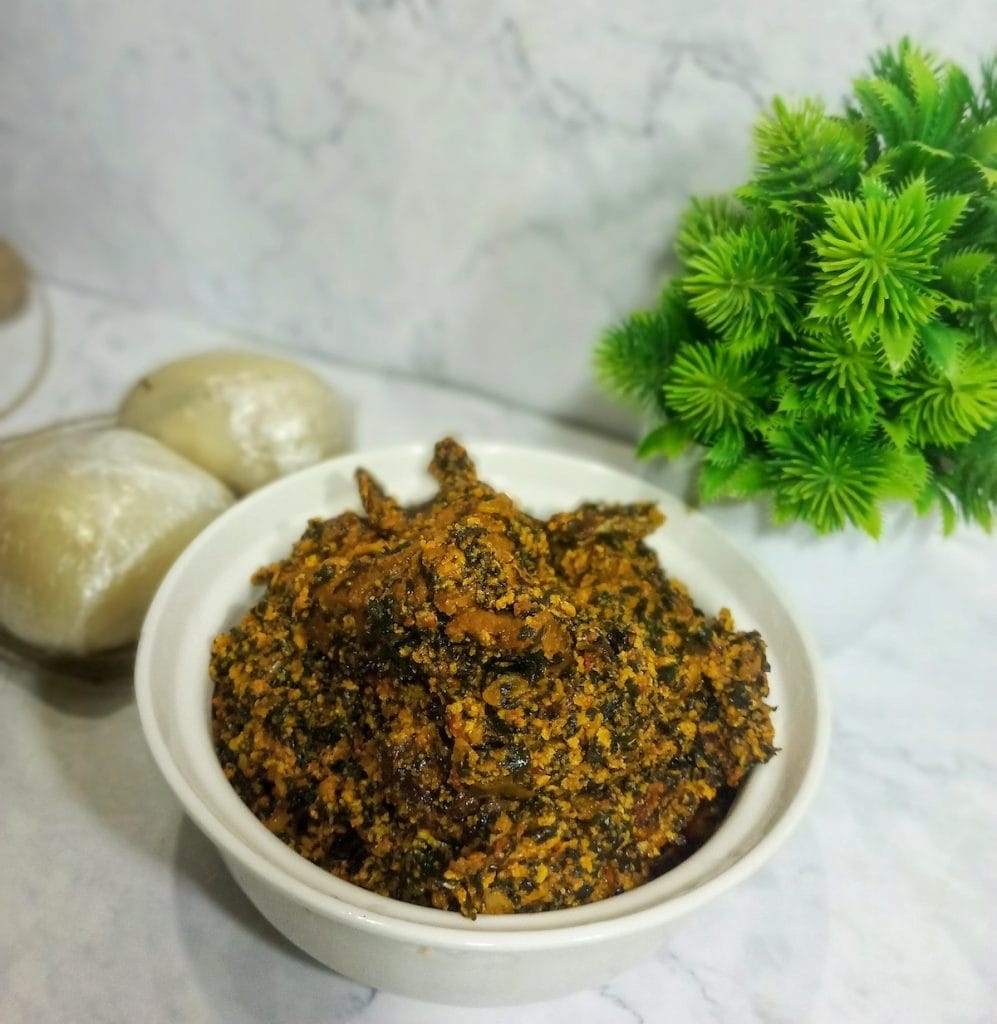
What Are The Benefits Of Nigerian Bitter Leaf Soup?
Blood sugar regulation – bitter leaf soup is perfect for those that want tighter control of their blood sugar. Flavonoids, triterpenoids, antiviral compounds, and glycosides in bitter leaves help to keep excessive sugar in the blood at bay.
Anticarcinogenic – Nigerian bitter leaf soup is also known to be rich in phytonutrients that can protect your body cells from oxidative damage that leads to diseases like cancer.
Great metabolic effect – you can already imagine that anything with a bitter taste has the potential to help with your weight loss journey, right?
Boosts fertility – bitter leaf soup can also improve the general function of the male and female reproductive system (more here).

Nigerian Bitter Leaf Soup Ingredients
- Fresh Bitter leaf – the bitter leaf is the number one ingredient of this African soup. It should be washed with plenty of water as many times as possible till only little hints of bitterness remain.
- Egusi – egusi, also known as melon seeds, is used to make your bitter leaf soup thicker. It is rich nutty flavor is part of what makes bitter leaf soup alluring in looks and taste.
- Habanero pepper – habanero pepper is a hot pepper that is ground with red bell pepper and tomatoes to form a pepper mix for your bitter leaf soup. The capsaicin content helps make your bitter leaf soup spicy.
- Red bell pepper – red bell pepper is another ingredient in the pepper mix, it adds a mildly sweet and earthy African taste to your bitter leaf soup. It is rich in nutrients like vitamins A, B6, C, E, and K, which are beneficial to your skin, hair, and overall health.
- Tomatoes – tomatoes make the pepper mix less spicy. Its sweet-sour taste makes the bitter leaf soup more delicious.
- Onions – chopped onions are sauteed in palm oil till all their scents infuse in the soup. onions essentially boost the aroma of Nigerian bitter-leaf soup as it does in other Nigerian soups.
- Ground pepper – ground pepper from peppercorns or dried cayenne pepper adds extra spice to your bitter leaf soup.
- Palm oil – red palm oil is an essential ingredient in cooking African food, especially vegetable soups. It serves as the base of this delicious soup. It is rich in carotenoids which improves your immune system functions.
- Beef – Cooked beef is one of the proteins used in this recipe. It blesses your bitter leaf soup with a rich umami taste that takes the richness of the soup from 90 to 100!
- Smoked fish – smoked fish is a dry fish that is cured for a period of time. It has a deep smoky flavor that makes your bitter leaf soup exceptionally appetizing.
- Ground crayfish – ground crayfish adds a distinct traditional flavor to Nigerian bitter leaf soup.
- Seasoning – add seasoning cube or powder to taste.
- Salt – add salt to taste.
- Egusi has very high nutritional value, it is rich in protein, fat and vitamins a, b1, b2 and c
- It is made up of 30 – 40 % protein and about the same proportion of oil
- The oil is cholesterol free
- 100% NATURAL RED PALM OIL – Unrefined to Preserve Nutrients, Antioxidants, Fatty Acids, Vitamins, & That Rich Taste That You Only Get From Food Grown Without Harmful Chemicals
- HAND HARVESTED & PRESSED IN GHANA – For That Deliciously Fresh, No After-Taste Yumminess. So Fresh has 3-Year Shelf Life, with NO Artificial Trans Fats. 100% Vegan. The sediment that you may see at the bottom of the bottle is a natural by product of the traditional extraction process used in Ghana, West Africa. In terms of oil quality, this sediment indicates that the you are Purchasing Natural, Unrefined Palm Oil that was Freshly Packed and Bottled.
- Fresh habanero Chili Peppers
- Ship Fresh and Fast
Tools Needed To Prepare Nigerian Bitter Leaf Soup
Ingredient Additions & Substitutions For Nigerian Bitter Leaf Soup
Beef Stock/Broth
The flavorsome assorted beef stock from boiling the beef can be an additional ingredient for your bitter leaf soup. It should be added alongside the cooked beef and fish.
Beef
Beef can be substituted with your other choice of meat like goat meat, cow foot, cow head meat, cow skin(ponmo), chicken, or turkey.
Smoked Fish
Smoked fish can be substituted with stock fish which is an unsalted type of dry fish that is dried by cold air. It has a deep earthier flavor than smoked fish.
This intense flavor especially mixes with the bitter leaf soup on the second day, making it extra delicious.
I personally prefer to pre-boil my stock fish and discard the fish broth to reduce the intensity of the fish flavor.

Egusi
Some people substitute egusi with cocoyam, achi, ofor, or ogbono to cook bitter leaf soup.
For cocoyam;
- Get 3-4 medium-sized cocoyam.
- Boil them in water till they are tender.
- Pill the skin off the cocoyam and pound it into a smooth paste.
- Add the grounded cocoyam at the same stage you add egusi in this recipe.
If you cannot get cocoyam tubers, you can use cocoyam flour. Add it to water to form a thick paste to be added to the soup, as discussed above.
For achi, ofor, and ogbono;
- Get the seeds of either of the thickeners
- Pound until smooth
- Add the pounded seeds at the same stage you add egusi in this recipe.
You can also make use of ready-made flour for either of these seeds.
Fresh Bitter Leaves
If you cannot get fresh bitter leaves, you can use dry bitter leaves. These dry leaves are already pre-chopped in fine pieces.
Just make sure to wash it thoroughly with clean water to remove all dirt and bitterness still on it. Depending on the quality of the dry bitter leaves you get, removing the dirt/sand might be a hassle.
I personally just buy fresh frozen bitter leaves from my local African store. I find that these rarely ever have sand or dirt. I still wash the leaves to remove the bitter taste though.
Ogiri or locust beans
I feel like I was this day years old when I learned about locust beans. Getting locust beans in the US was like looking for a needle in a haystack.
I literally stockpiled a few bottles of locust beans when I finally found them at an African store.
Ogiri is actually a traditional ingredient Africans add to their soup to bring out the traditional flavor of the food.

How to Cook Bitter Leaf Soup with Egusi (Step-by-step)
Ingredients
- 2 cups ground egusi seeds
- 2-3 cups bitter leaf (washed and drained)
- ½ cup palm oil
- 2 lbs precooked beef
- 1 lbs smoked fish (deboned and washed)
- 2 fresh tomatoes (ground)
- 3-4 red pepper (ground)
- ½ onion (chopped)
- 1 habanero pepper (ground) optional
- 1 tsp ground pepper optional
- 2 tsp seasoning powder
- 2 tsp ground crayfish
- 1 tsp salt, to taste
Instructions
Cooking Ofe Onugbu (Bitter Leaf Soup)
STEP 1: Pour palm oil into a cooking pot and set to medium heat.

STEP 2: Once the oil changes color from orange-red to deep red, add chopped onions. Let it saute for 2-3 minutes.

STEP 3: Next, add the blended pepper and tomato mixture and cook for 5-10 minutes. The goal is to allow the mixture to reduce.

STEP 4: Add the precooked beef and mix.

STEP 5: Follow by adding the precleaned smoked fish.

STEP 6: Now add the spices (beef seasoning, ground pepper, crayfish, and salt). Continue cooking on medium heat.

STEP 7: In a separate bowl, mix your egusi with warm water and create round balls. These will turn into small chunks of meaty egusi when the dish is ready.
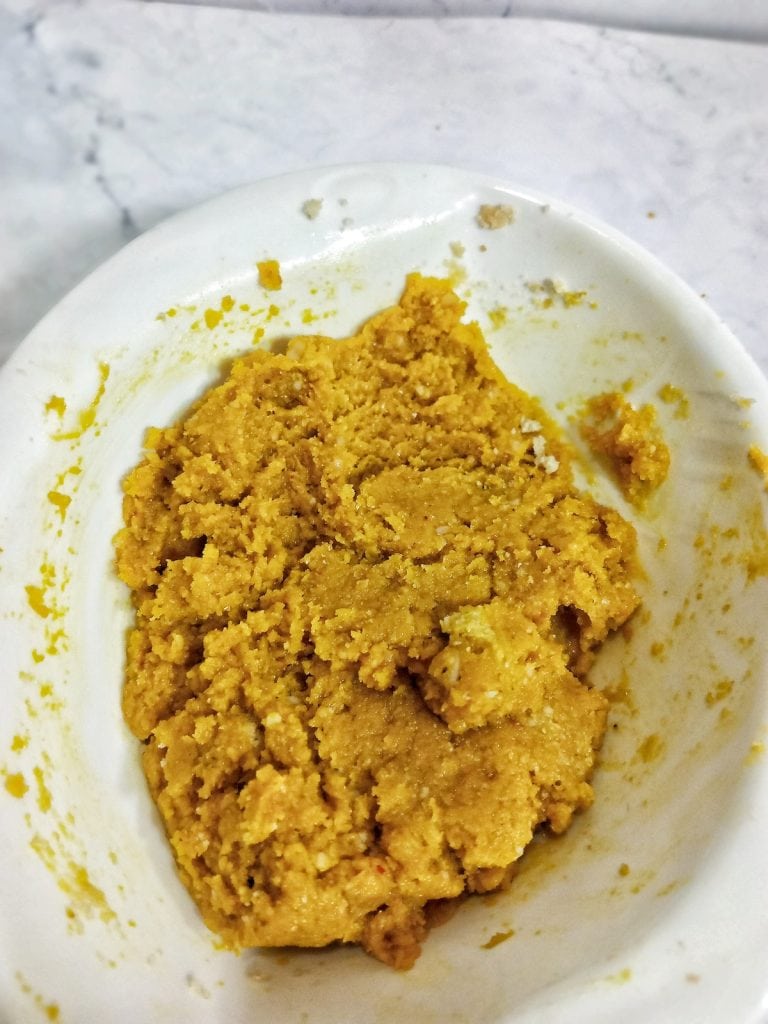

STEP 8: Add the egusi balls to the pot. Do not stir. Cook for 5 minutes on low to medium heat with the pot covered.
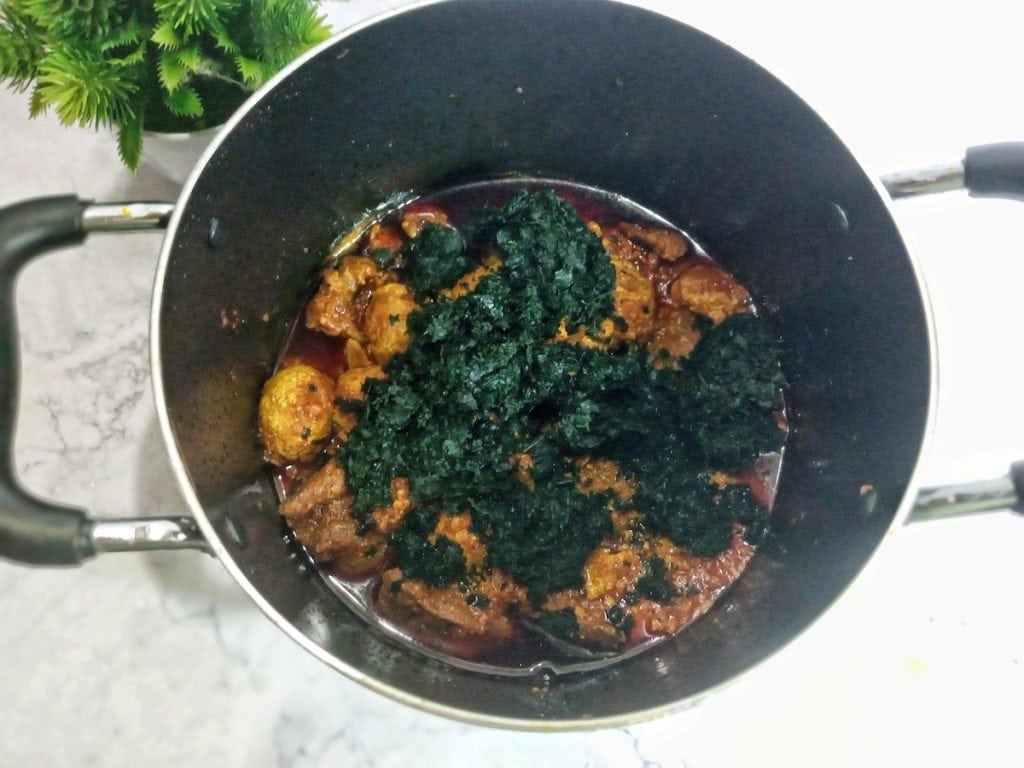
STEP 9: Add the washed bitter leaves (see instructions in the notes section below). Stir and cook for another 3-5 minutes until the bitter leaf is wilted.
STEP 10: Serve hot with your choice of swallow.
What To Serve With Nigerian Bitter Leaf Soup
- Fufu (cocoyam or plantain flour)
- Eba (yellow garri)
- Pounded yam or poundo yam
- Yam or cassava flour meal (Àmàlà)
- Semovita (Semolina)
- This particular recipe (with egusi) also allows you to enjoy bitter leaf soup with white rice.


Tips About Making Nigerian Bitter Leaf Soup
- Use a pressure cooker for cooking your meat to make the cooking process faster.
- Medium heat is all that is required throughout the cooking process. A high-temperature heat might give you an undesirable result.
- If you are using frozen bitter leaves, thaw them by leaving them in an open space for about an hour. Or better still, microwave the frozen leaves for 2-3 minutes.
- If you are using fresh bitter leaves, it is better to chop them into very small pieces. This makes it more pleasing to eat.
How To Store Nigerian Bitter Leaf Soup
Put your bitter leaf soup in an airtight container and store it in a fridge or freezer. While it lasts for one week in the fridge, the freezer will keep it for about one month without changing the taste.
The belief is that the days-old bitter leaf soup tastes better. This is because the soup has soaked into the proteins, which makes it more delicious.

How To Reduce The Bitterness In Bitter Leaf Soup
It takes three simple steps to reduce the degree of bitterness in your bitter leaf before using it to cook soup.
- Boil the chopped bitter leaves in a medium-sized pot with 2-3 cups of water
- After it has boiled for 15-20 minutes, pour the mixture of water into a sieve so that the hot water drains off
- Wash the leaves 3-4 times with cold water
- Now your bitter leaf is ready to be used.
This same method should be used for dry bitter leaves.

To wash out bitterness from fresh bitter leaves without boiling it in a pot, do the following:
- Put the leaves into a fine mesh sieve and place them in a large bowl with some water (enough to cover the leaves). Rub them between your palms until they feel soft.
- Eventually, the water will turn dark green. Strain and replace the water. This is where the sieve is useful. Simply lift up the colander and discard the green water.
- After straining out the leaves, rinse and replace the bowl with fresh, clean water.
- Keep rubbing the leaves between your fingers and replacing the water until the water becomes almost clear and the leaves lose most of their bitterness. It may take up to rounds of doing this.
- When squeezed out, the bitter leaves become ready for use in cooking your pounded yam and egusi soup (or any soup that calls for the use of bitter leaves).
What Is Bitter Leaf Called In Igbo Language?
Bitter leaf soup is called ofe onugbu in the Igbo language. ‘Ofe’ means soup and ‘onugbu’ means bitter leaf.
FAQ About Nigerian Bitter Leaf Soup
Can a pregnant woman eat bitter leaf soup?
Yes! According to research, vernonia amygdalina is rich in compounds that ease giving birth. It strengthens the uterus muscles and prevents complications like hemorrhage bleeding in pregnant women.
Can bitter leaf soup cause miscarriage?
There is no hard evidence that bitter leaf soup causes miscarriage. Bitter leaf contains many nutrients that are beneficial for pregnant women (more here).
Why is bitter leaf soup spicy?
Bitter leaf soup is spicy because it is made with hot peppers like habanero. You should reduce the quantity of pepper if you have a low tolerance to heat.
Is bitter leaf harmful?
No, bitter leaf is not harmful to humans when taken in moderation.
Can I chew bitter leaf raw?
Yes, you can chew bitter leaf raw. I can’t stand the bitter taste of raw bitter leaf, but some people eat it raw for health benefits.
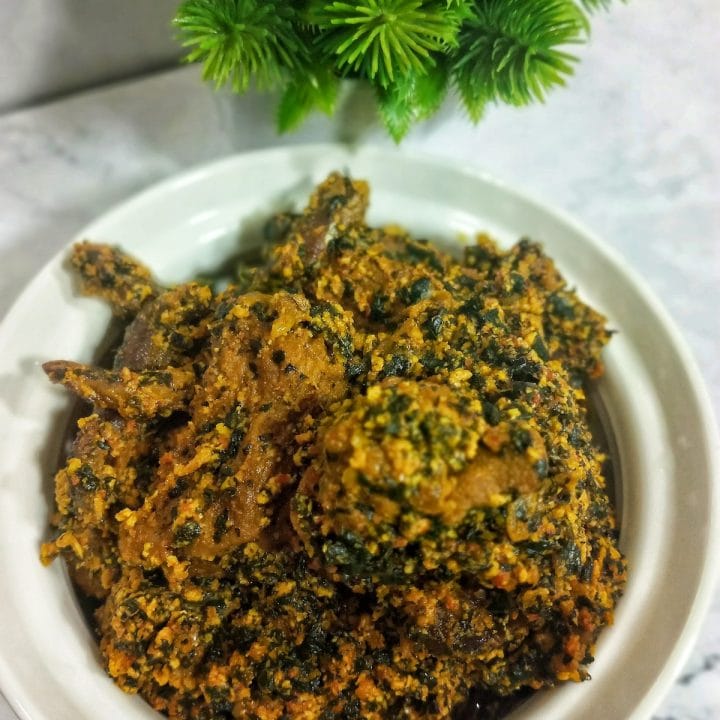
Bitter Leaf Soup (Ofe Onugbu)
Nigerian Bitter Leaf Soup is a traditional dish that is packed with flavor. If you're looking for a new soup to add to your repertoire, this is the perfect recipe for you!
Ingredients
- 2 cups ground egusi seeds
- 2-3 cups bitter leaf (washed and drained)
- ½ cup palm oil
- 2 lbs precooked beef
- 1 lbs smoked fish (deboned and washed)
- 2 fresh tomatoes (ground)
- 3-4 red pepper (ground)
- ½ onion (chopped)
- 1 habanero pepper (ground) optional
- 1 tsp ground pepper optional
- 2 tsp seasoning powder
- 2 tsp ground crayfish
- 1 tsp salt, to taste
Instructions
Cooking Ofe Onugbu (Bitter Leaf Soup)
- Pour palm oil into a cooking pot and set to medium heat.
- Once the oil changes color from orange-red to deep red, add chopped onions. Let it saute for 2-3 minutes.
- Next, add the blended pepper and tomato mixture and cook for 5-10 minutes. The goal is to allow the mixture to reduce.
- Add the precooked beef and mix.
- Follow by adding the precleaned smoked fish.
- Now add the spices (beef seasoning, ground pepper, crayfish, and salt). Continue cooking on medium heat.
- In a separate bowl, mix your egusi with warm water and create round balls. These will turn into small chunks of meaty egusi when the dish is ready.
- Add the egusi balls to the pot. Do not stir. Cook for 5 minutes on low to medium heat with the pot covered.
- Add the washed bitter leaves (see instructions in the notes section below). Stir and cook for another 3-5 minutes until the bitter leaf is wilted.
- Serve hot with your choice of swallow.
How to Remove Bitterness From Bitter Leaves
- Put the leaves into a fine mesh sieve and place them in a large bowl with some water (enough to cover the leaves). Rub them between your palms until they feel soft.
- Eventually, the water will turn dark green. Strain and replace the water. This is where the sieve is useful. Simply lift up the colander and discard the green water.
- After straining out the leaves, rinse and replace the bowl with fresh, clean water.
- Keep rubbing the leaves between your fingers and replacing the water until the water becomes almost clear and the leaves lose most of their bitterness. It may take up to rounds of doing this.
- When squeezed out, the bitter leaves become ready for use in cooking your pounded yam and egusi soup (or any soup that calls for the use of bitter leaves).
Notes
To wash out bitterness from fresh bitter leaves, do the following:
- Put the leaves into a fine mesh sieve and place them in a large bowl with some water (enough to cover the leaves). Rub them between your palms until they feel soft.E
- ventually, the water will turn dark green. Strain and replace the water. This is where the sieve is useful. Simply lift up the colander and discard the green water.
- After straining out the leaves, rinse and replace the bowl with fresh, clean water.
- Keep rubbing the leaves between your fingers and replacing the water until the water becomes almost clear and the leaves lose most of their bitterness. It may take up to rounds of doing this.
- When squeezed out, the bitter leaves become ready for use in cooking your pounded yam and egusi soup (or any soup that calls for the use of bitter leaves).
Nutrition Information:
Yield: 6 Serving Size: 1Amount Per Serving: Calories: 910Total Fat: 65gSaturated Fat: 23gTrans Fat: 1gUnsaturated Fat: 37gCholesterol: 158mgSodium: 1753mgCarbohydrates: 13gFiber: 4gSugar: 6gProtein: 72g
* Please note that all nutrition information are just estimates. Values will vary among brands, so we encourage you to calculate these on your own for the most accurate results.
Conclusion
This Nigerian bitter leaf soup is one pot full of everything good.
Don’t let the name deter you—the bitterness of the leaf is offset by the addition of other ingredients, resulting in a flavorful and hearty soup.
The bitterness of the leaf is what gives the soup its unique flavor. The bitterness is also what makes this soup good for your health.
Ofe Onugbu is easy to cook if you put in the patience to wash the bitter leaves well. Don’t forget a big cup of fruit juice while you enjoy it with your favorite Nigerian swallow food!

If you’re looking for a tasty and nutritious soup to add to your repertoire, bitter-leaf soup (Onugbu Egwusi) is a great option!
This traditional Igbo dish is packed with leafy greens, meats, and fresh and dry fish, making it a well-rounded meal that’s full of nutrients.
Plus, it’s easy to make and can be customized to your liking. Give Onugbu Egwusi a try today!
Loved this Bitter leaf soup recipe? Here are more Nigerian food recipes you should try:




